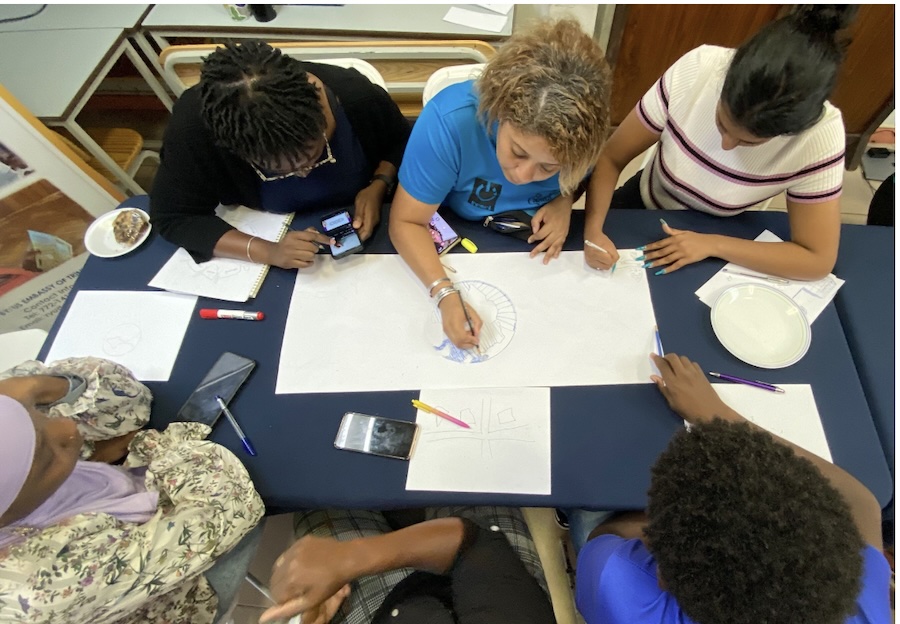.. DEMOCRATIC PARTICIPATION ..
An article by Rotary Peace Fellows and Rotary Positive Peace Activators María Antonia Pérez and Scott R. Martin in the Rotary Service Blog
The island of Trinidad has one of the most diverse populations in the Caribbean. In recent years, however, the political and economic instability of its closest neighbor, Venezuela, has led to a sharp increase in migration, tension and potential for conflict. Cashew Gardens, a neighborhood in Trinidad that has worked to build a stronger community, contacted Mediators Beyond Borders International for help integrating Venezuelan migrants.
With support from Rotary International, the Institute for Economics and Peace, Mediators Beyond Borders International and the community of Cashew Gardens, we led the “Building Bridges: Connecting Communities for Positive Peace and Harmony” workshop.

Local Trinidadians and Venezuelan migrants got together to explore conflict resolution, trauma healing, social entrepreneurship, and the eight Pillars of Positive Peace. The goal was to co-design an inclusive and sustainable green market (a place for local agriculture, artisanal products and social entrepreneurial services) for the community.
We wanted to bring leaders together from each of the cultural communities in the region to learn from one another and establish a common language. The Positive Peace framework helped them identify their needs and express them through different value systems. The hope was that the participants could then help design the green market and develop the social and economic programs essential to its success. The Pillars of Positive Peace provided an excellent platform to support that success.
This initial workshop, supported through seed funding for Rotary Positive Peace Activator projects, was conducted in both English and Spanish and brought together a culturally diverse group of dedicated Trinidadians and Venezuelan immigrants, ages 15 to 65, for four days of learning, sharing, and building together. This also marked the first time Rotary Positive Peace Activators from the North American and Caribbean cohort and South American cohort had collaborated together.
In addition to being Positive Peace activators, we are also Rotary Peace Fellows with different professional experiences, so our participation was deeply personal and fulfilling, not only as part of our commitment to the vision of Rotary, but also to our shared belief in the power of community engagement, art, and social entrepreneurship as tools for peacebuilding.
(Article continued in right column)
How important is community development for a culture of peace?
(Article continued from left column)
The workshop focused on these key areas:
Community Cohesion, Conflict and Trauma Awareness
Understanding the Positive Peace framework and the eight Pillars
Cross-Cultural Communication and Social Entrepreneurship
Project Design and Collaboration
These themes were crucial in addressing the unique challenges faced by the participants, who came from unique backgrounds and experienced different economic and social challenges. Many participants had known of each other for years, but this was their first time working together.
The interactive model fostered meaningful conversations, collaborative activities, and powerful storytelling that underscored the potential of unity and shared understanding. The group utilized the tools, methodologies, and resources centered around conflict management, trauma, universal needs, and Positive Peace to think critically about their current roles in the community and brainstorm what more is possible. The dedication and enthusiasm of the participants was truly inspiring, and resulted in clear directives and areas for collaboration moving forward.
We were grateful and inspired by local organizations such as The Ryu Dan Empowerment Foundation, La Casita, and Living Waters for their contributions and commitment to continue collaborating with our team and Cashew Gardens to weave the social fabric for joint prosperity.
While our journey is still in its early stages, the first workshop marked a significant step forward. Participants deepened their understanding of the Positive Peace framework, enhanced their conflict literacy, and learned to navigate cross-cultural interactions. This foundation will empower them to become effective partners within their communities.
The workshop also yielded tangible outcomes. Participants actively discussed and began to envision the potential spaces of the green market. Ideas included a dedicated playground for children and the incorporation of vocational services like a nail salon or barber shop, providing opportunities for underemployed youth.
Furthermore, a group chat has been established where members from the four participating organizations can connect, attend each other’s events, and cross-promote their initiatives. This fosters ongoing partnerships and strengthens community engagement.
The experience highlighted the importance of collaboration among Rotary Peace Fellows and Rotary Positive Peace Activators from across different regions. The cultural and gender balance of the team was also important for connecting fully with the participants. The workshop not only reinforced the principles of Positive Peace but also illustrated the impact that cross-cohort collaboration can have in driving meaningful, sustainable change. As Rotary Positive Peace Activators, we remain committed to continuing this journey, building more bridges, and creating spaces where peace can flourish.
Rotary Positive Peace Activators are Rotary and Rotaract members, Rotary Peace Fellows, and Rotary Action Group members who have been trained through the Rotary Positive Peace Activator program. Learn more about the Rotary Positive Peace Activator network and the Rotary-Institute for Economics and Peace partnership.